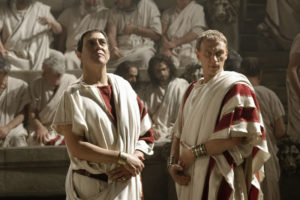[Greek] λαμπρός (lampros), [Latin] alba, [Latin] candida: bright, shiny, brilliant, clear, splendid, magnificent, gorgeous; Lk.23:11, Act.10:30, Jas.2:2, Rev.22:6, Rev.18:14, Rev.15:6, Rev.19:8, Rev.22:16

The candidatus (political candidate) aspires to be in office wearing a bright white toga (candida toga)
Background Information:
Greek Hellenism: This Greek term, meaning shining, radiant, and bright, is used of objects. These objects refer to the stars, the sun, the moon, the morning star, shiny helmets, water, stones, and clothes. Lightness does not really have a strong connection with gods or deities. Those who seek the oracle wear white clothes. Those who seek an office in a philosophical school often wear white clothes. In a figurative sense, this Greek term means smart, stately, beautiful, generous, respected, and distinguished.
Old Testament: The Old Testament faith is not really considered as a religion of light. Light is not deified. The focus is more on God Himself. There is a connection of light with God in the sense of God as Creator. Yahweh created light. Fire, in various forms, is used to identify God. Nowhere is there a passing of the divine substance of light from God to man. The gulf between God and sinful man is too great.
Judaism: The luminous glory of Yahweh is further developed in Judaism. The Shekinah is represented as radiant light. God has no need of lights. The emphasis is mostly on Israel. God seeks to remind Israel to shine for Him. God gives Israel the opportunity to attain merit by keeping the lamp and by the flames of the seven-branched candelabra. So Israel (Jerusalem) must be the light of the world.
New Testament: This term means fine, resplendent, and dazzling. After mocking Jesus, Herod and his soldiers put Jesus in a resplendent garb to meet. At prayer Cornelius saw a man in dazzling white stating that his prayers were answered. James we must show no partiality as you adhere to your faith. Yet one will recognize a rich man with rings in fine clothes rather than a person in shabby clothing.
Scripture:
“Even Herod and his soldiers treated Him contemptuously and mock Him, and after clothing Him in resplendent garb, he sent Him back to Pilate.” Lk.23:11
The soldiers mostly likely dressed Jesus in a purple garment. The color purple represents kingship. They mocked Jesus as being king of the Jews.
“Cornelius replied, ‘Four days ago at this hour, three o’clock in the afternoon, I was at my prayer house when suddenly a man in dazzling clothes before me.’” Act.10:30
The dazzling image of the angel represents the glory and majesty of God.
“For if a man with gold rings on his fingers and in fine clothes comes into your assembly.” Jas. 2:2
Fine clothes represents a person’s wealth and stature. Most people will pay attention to the rich man.

Conclusion:
Lamp, albino, candid
This Greek term can refer to both white, bright and vibrant colors. These colors are representative of kings, politician, and public leaders. In Roman times, a toga candida (bright white toga) was worn by politicians. Politicians often did dress to impress others. It is interesting to note that the Latin candidatus is one aspiring to office wearing white robes. This becomes the origin of the current term candidate.
